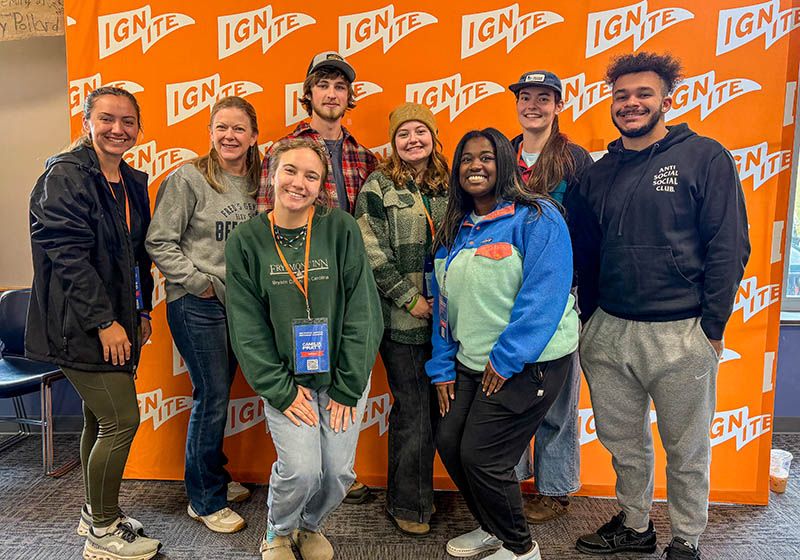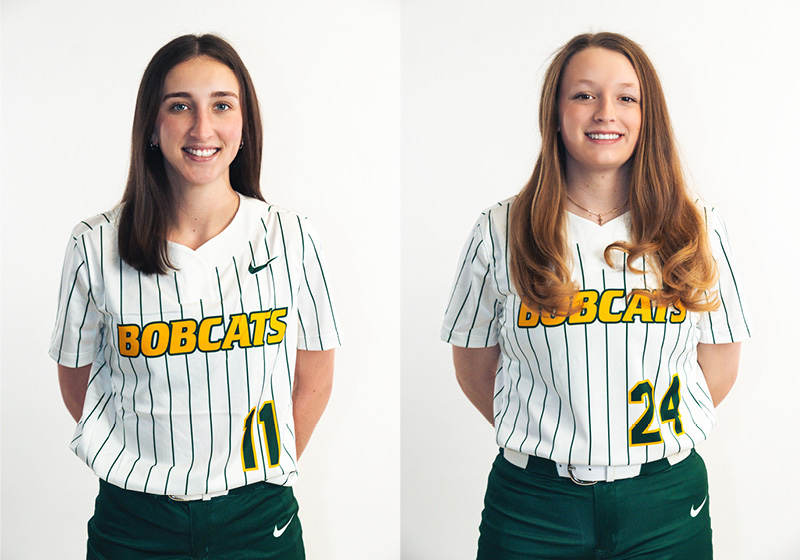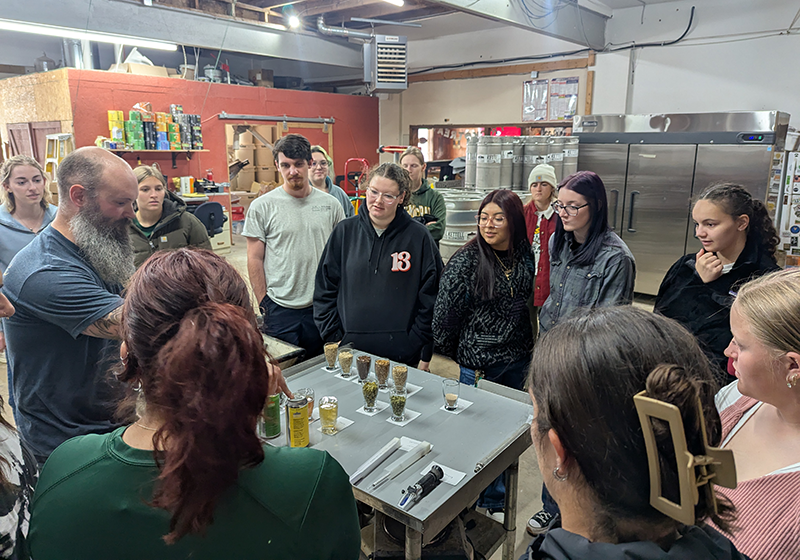
Meet your history faculty
In terms of pure versatility and general skill-building, few majors compare to History. Earning a degree in History prepares students for a variety of different post-graduate paths, and while becoming a professor or historian is certainly a viable one, Lees-McRae history graduates also go on to become teachers, athletic directors, lawyers, marketing professionals, PhD candidates, and more.
One of the things that makes the college’s history department so strong is the variety of perspectives and courses offered by the program’s faculty. Offering a diverse range of courses that apply to students across academic disciplines creates a history program that appeals not only to majors and minors, but also to non-major students who are looking to expand their academic experience.
Get to know your history faculty to learn more about why studying the subject is important, and just how variable a degree in the field can be.

Scott Huffard
Program Coordinator for History, Professor of History
How long have you been teaching at the college?
I’ve been at the college since 2013. I got the job fresh out of grad school and stuck around. It’s a very nice area that has very much grown on me. It’s a good place to end up.
What courses are you teaching this semester?
History 120: US and the World, which is kind of a U.S. survey. The class is going to organize around these questions of what America’s role in the world has been, and what it should be. We try to engage the present through the past in that class.
Another class is Global History of Disease, where each week we talk about a different epidemic or outbreak. That’s always a really popular class with both majors and non-majors. I have some pre-vet students in that class.
I’m also teaching a class called Wilderness in the American Mind. It’s sort of an environmental history class that is organized around this big question of how Americans have treated the wilderness throughout history. That class draws a lot of Outdoor Recreation Management students, and it’s part of the outdoor rec program even.
What is your primary area of personal study and interest?
My training is as a 19th-century American historian. I focused particularly on the late 19th-century South in grad school, so the Civil War, Reconstruction, and the New South period.
I have a particular interest in the South and Southern Appalachia. Both are things that I’ve written, researched, and taught about.
How did you first become interested in that topic?
I’m originally a Yankee from Pennsylvania. I went to Penn State for undergrad and took a lot of Civil War classes. As a kid we would always go on trips to the south, and I would always make my parents stop at battlefields or get barbecue. I always found the south to be a fascinating place.
I applied to a bunch of graduate programs and went to the University of Florida, which has a very strong history program, and that’s where I decided, ‘I’m going to do this, and study the south.’
Why do you find that branch of history interesting and important to study?
The south is kind of how we understand America. The issues in the south are ones that America faces generally. We talk about race obviously, and a lot of my work is about the impact of capitalism on the region, and big corporations like the railroad.
I’ve always been interested too in the music and the folkways of the south, which are in some ways national and international folkways. Everyone loves country music now, for example. It’s a region that we sometimes see as parochial and backwards in America, but it’s also one that reveals a lot about the country as a whole. The same thing applies to Appalachia too. It’s often seen as isolated and disconnected, but it’s far from that really.

Robert Turpin
Director of Honors Program, Faculty Athletics Representative, Professor of History
How long have you been teaching at the college?
I began in August of 2014, so it’s been a little over ten years at this point.
What courses are you teaching this semester?
World Civilizations since 1400 and Honors First Year Seminar for incoming juniors. Next semester I’m teaching American History Part II for the first time ever at Lees-McRae, and The History of Gender and Sexuality.
What is your primary area of personal study and interest?
I am a social historian, which means my interests often overlap with sociologists and anthropologists.
I am most interested in topics related to constructions of race, class, and gender. I could also be considered a sports historian since my research has focused on bicycles and cycling. I have also created two courses at Lees-McRae related to sport history.
How did you first become interested in that topic?
I grew up in a poor community and my grandparents on both sides of the family were very poor. My paternal grandparents were tenant farmers in Kentucky whose only transportation was a Massey Ferguson 135 tractor, and a mule named Kate, so I grew up with a special place in my heart for the poor and powerless.
Researching issues related to race and gender is really, at its heart, an examination of relationships of power. This is where my interest and passion for these subjects come from.
I gravitated toward cycling because I was an avid and competitive cyclist before graduate school. I quickly found that sport, and cycling more specifically, offers a lens through which we can examine ideas about race, gender, and class as well as their interconnectivity.
Why do you find that branch of history interesting and important to study?
Sport has reached a place in our society that rivals and perhaps eclipses politics as far as interest and engagement goes. The fact that so many people partake in sport, be it actively or passively, and the fact that it generates such massive revenue, makes it a very important field of study.

Mike Davis
Adjunct for History
How long have you been teaching at the college?
I've been teaching at Lees-McRae since 2022. I was full-time during the 2022–23 academic year when Scott Huffard was writing his book, and I've been teaching part-time since.
What courses are you teaching this semester?
This year I'm teaching History of Southern Appalachia in an online setting.
What is your primary area of personal study and interest?
I'm a historian, and I have a wide variety of professional interests and publications.
My current project is a history of fictional World War IIIs, particularly Cold War-era visions of an American victory over the Soviet Union.
How did you first become interested in that topic?
I took a particular interest when I was writing what's eventually going to be a chapter in my book manuscript—a history of one particular failed attempt at an imagined WW3. “THE WAR WE DO NOT WANT” was a patriotic vision of American victory in nuclear conflict in 1951 that brought outrage from the liberal New Dealers that were supposed to be its main audience.
This got me thinking about these “counter-narratives” of nuclear apocalypse; the idea that yes, we can have the great civilization-defining struggle of the Cold War without horrific and civilization-ending consequences. So often when we think of imagined WW3s, we imagine stories that are about the end of the world, but from Pat Frank to Tom Clancy to many other authors I'll get into in my book, the question is instead, "What if the war we're all worried about happens—and the world doesn't end? What does the world look like? What do we do?"
Why do you find that branch of history interesting and important to study?
Cold War memory is rapidly fading. This is especially true for intellectual histories like my project, so this is an important story to tell before we lose interest in telling it altogether.
We live in an era of anxieties, in particular anxiety about self-inflicted catastrophes. From climate change to pandemics to wars, we live in fear of what we may do to ourselves. Studying the Cold War and nuclear anxieties, so many years after 1991, winds up being comforting for me in that light.
Generations lived out their days in the shadow of the Cold War and the bomb and now they simply don't do that anymore because we stopped the nuclear posturing between the US and the USSR. It is possible for us to turn things around, to look Armageddon in the face and go another direction. If we want to make things better, we can do it. We just have to want to.


